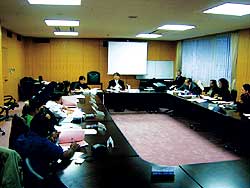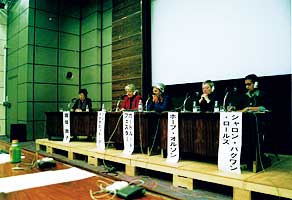![]()
Evaluation study on: "Women in Development (WID) / Gender Policy-Evaluation of Initiative on WID"
In FY 2002, the Ministry of Foreign Affairs conducted the Evaluation Study on "Women in Development (WID)/ Gender Policy - Evaluation of Initiative on WID" in collaboration with outside experts.
The study evaluated the Initiative on WID announced by the Japanese government at the 4th World Conference on Women in 1995 in assuming the Initiative on WID as a WID/gender policy. The study aimed to identify outcomes/problems in the past, and yield recommendations for better policy-planning/implementation in the future. The subject area of the study was "education," "health," and "economic and social participation", which were three priority areas of the Initiative on WID and picked up Guatemala and Honduras as case study nations.
The study found the following points as relevant: (i) the Japanese Government announced to make continuous efforts to enhance WID-related development assistance with consideration for women's participation to, and women's benefits from development in 1995; (ii) efforts for project finding on WID-related development assistance have been continued by the Japanese Government in the case study countries. The study showed that WID is a necessary and complementary means to achieve gender equality and also pointed out that Japan's efforts should not be limited to these three priority areas of the Initiative on WID, and should be recognized as a part of the comprehensive initiatives to achieve gender equality.
In response to the issues found this time, the study proposed recommendations, for example, that call to further utilize knowledge of experts and implementing agencies, better utilize/enhance WID focal points of the Ministry of Foreign Affairs, and to put more emphasis on the gender-mainstreaming perspective in the revising Initiative.
Seminar for Promotion of Gender Equality II
|
The Cabinet Office and the Japan International Cooperation Agency (JICA) held the "Seminar for Promotion of Gender Equality II" over a month period October 14 through November 15, 2003. Japan holds this seminar for division director or higher level officials of national machinery among developing countries. The purpose of this seminar is to contribute to improving women's status by strengthening the functions of national machineries in each country. This year, 12 participants attended the seminar from the nine nations of Afghanistan, Bangladesh, Bhutan, Cambodia, Chile, Columbia, Papua New Guinea, Senegal, and Zimbabwe. |
 Participants from nine nations listen to a lecture on Japanese government policies for achieving gender equality. |
Participants were lectured on Japanese government measures conccerning the formation of a gender-equal society, exchanged their views with specialist committee members of the Council for Gender Equality, and listened to lectures on measures taken by Japanese local governments. The participants had active discussions among themselves, exchanging information and opinions on the measures taken by national machineries in their own countries. As an outcome of this seminar, the participants prepared and reported to each other the action plans their national machineries would carry out after their returning.
Seminar for Promotion of Education for Girls and Women
The National Women's Education Center held the "Seminar for Promotion of Education for Girls and Women" for four weeks from February 11 to March 8, 2003, consigned by the Japan International Cooperation Agency. Ten participants from eight African and Asian nations (Cambodia, Ethiopia, Ghana, Benin, Ivory Coast, Niger, Democratic Republic of Congo, and Togo) attended seminar.
This seminar aims at identifying the present situations surrounding women's education, providing training sessions for the necessary promotion measures, and acquiring philosophies and information that are necessary to correct the gender educational gap in developing nations.
Through lectures and discussions on Japan's female education programs and women's problems in general as well as site visits to Japan's elementary and junior high schools, participants deepened their understandings about educational policies that would contribute to improving women's status.
International Training Course on Processing Women's Information and International Forum on Women's Information
The National Women's Education Center held the "International Training Course on Processing Women's Information" for 14 days from December 5, 2003. This course provides information-processing-related training sessions for government officials and NGO leaders in the Asia-Pacific region. This year, 29 trainees from 22 nations participated in this program.
On December 13 and 14, 2003, the National Women's Education Center also held the "International Forum on Women's Information" under the theme, "Toward Global Network of Women's Information: Outlook and Proposal for Empowerment Strategies based on Women's Information." During the morning of December 13, Lin McDevitt-Pugh, program director at the International Information Centre and Archives for the Women's Movement (IIAV), delivered a keynote speech. In the afternoon, participants were divided into three workshops to hold discussions. On December 14, a symosium was held with foreign experts in charge of the workshops. The above-mentioned trainees also participated in this forum and enthusiastically shared their viewpoints.

Panelists hold discussions on "Outlook and
Proposal for Empowerment Strategies based on
Women's Information."
